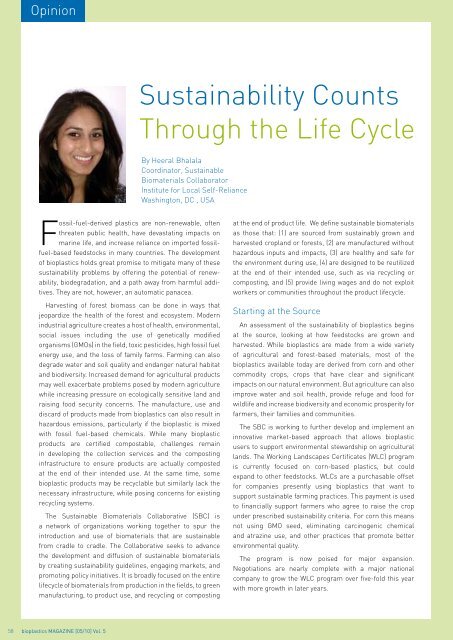05 | 2010
You also want an ePaper? Increase the reach of your titles
YUMPU automatically turns print PDFs into web optimized ePapers that Google loves.
Opinion<br />
Sustainability Counts<br />
Through the Life Cycle<br />
By Heeral Bhalala<br />
Coordinator, Sustainable<br />
Biomaterials Collaborator<br />
Institute for Local Self-Reliance<br />
Washington, DC , USA<br />
Fossil-fuel-derived plastics are non-renewable, often<br />
threaten public health, have devastating impacts on<br />
marine life, and increase reliance on imported fossilfuel-based<br />
feedstocks in many countries. The development<br />
of bioplastics holds great promise to mitigate many of these<br />
sustainability problems by offering the potential of renewability,<br />
biodegradation, and a path away from harmful additives.<br />
They are not, however, an automatic panacea.<br />
Harvesting of forest biomass can be done in ways that<br />
jeopardize the health of the forest and ecosystem. Modern<br />
industrial agriculture creates a host of health, environmental,<br />
social issues including the use of genetically modified<br />
organisms (GMOs) in the field, toxic pesticides, high fossil fuel<br />
energy use, and the loss of family farms. Farming can also<br />
degrade water and soil quality and endanger natural habitat<br />
and biodiversity. Increased demand for agricultural products<br />
may well exacerbate problems posed by modern agriculture<br />
while increasing pressure on ecologically sensitive land and<br />
raising food security concerns. The manufacture, use and<br />
discard of products made from bioplastics can also result in<br />
hazardous emissions, particularly if the bioplastic is mixed<br />
with fossil fuel-based chemicals. While many bioplastic<br />
products are certified compostable, challenges remain<br />
in developing the collection services and the composting<br />
infrastructure to ensure products are actually composted<br />
at the end of their intended use. At the same time, some<br />
bioplastic products may be recyclable but similarly lack the<br />
necessary infrastructure, while posing concerns for existing<br />
recycling systems.<br />
The Sustainable Biomaterials Collaborative (SBC) is<br />
a network of organizations working together to spur the<br />
introduction and use of biomaterials that are sustainable<br />
from cradle to cradle. The Collaborative seeks to advance<br />
the development and diffusion of sustainable biomaterials<br />
by creating sustainability guidelines, engaging markets, and<br />
promoting policy initiatives. It is broadly focused on the entire<br />
lifecycle of biomaterials from production in the fields, to green<br />
manufacturing, to product use, and recycling or composting<br />
at the end of product life. We define sustainable biomaterials<br />
as those that: (1) are sourced from sustainably grown and<br />
harvested cropland or forests, (2) are manufactured without<br />
hazardous inputs and impacts, (3) are healthy and safe for<br />
the environment during use, (4) are designed to be reutilized<br />
at the end of their intended use, such as via recycling or<br />
composting, and (5) provide living wages and do not exploit<br />
workers or communities throughout the product lifecycle.<br />
Starting at the Source<br />
An assessment of the sustainability of bioplastics begins<br />
at the source, looking at how feedstocks are grown and<br />
harvested. While bioplastics are made from a wide variety<br />
of agricultural and forest-based materials, most of the<br />
bioplastics available today are derived from corn and other<br />
commodity crops, crops that have clear and significant<br />
impacts on our natural environment. But agriculture can also<br />
improve water and soil health, provide refuge and food for<br />
wildlife and increase biodiversity and economic prosperity for<br />
farmers, their families and communities.<br />
The SBC is working to further develop and implement an<br />
innovative market-based approach that allows bioplastic<br />
users to support environmental stewardship on agricultural<br />
lands. The Working Landscapes Certificates (WLC) program<br />
is currently focused on corn-based plastics, but could<br />
expand to other feedstocks. WLCs are a purchasable offset<br />
for companies presently using bioplastics that want to<br />
support sustainable farming practices. This payment is used<br />
to financially support farmers who agree to raise the crop<br />
under prescribed sustainability criteria. For corn this means<br />
not using GMO seed, eliminating carcinogenic chemical<br />
and atrazine use, and other practices that promote better<br />
environmental quality.<br />
The program is now poised for major expansion.<br />
Negotiations are nearly complete with a major national<br />
company to grow the WLC program over five-fold this year<br />
with more growth in later years.<br />
58 bioplastics MAGAZINE [<strong>05</strong>/10] Vol. 5


















